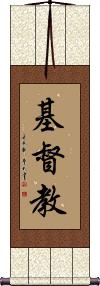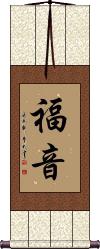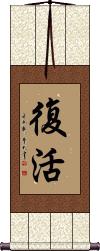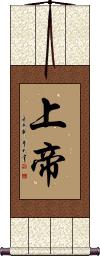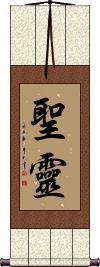Many custom options...
And formats...

Christianity Christian in Chinese / Japanese...
Buy a Christianity Christian calligraphy wall scroll here!
Personalize your custom “Christianity Christian” project by clicking the button next to your favorite “Christianity Christian” title below...
Christianity / Christian
基督教 is the Chinese, Japanese and Korean word for “Christianity.”
Just as in English, this word is often used to mean “Protestant” but includes Catholics in the true definition.
It is the word used to refer to the whole “Christian religion” or “Christian Faith,” and therefore, it can be translated as “Christianity.” However, used as an adjective in regard to a person, it would translate as “Christian.” But more like saying, “His religion is Christianity,” rather than a noun form.
If you break it apart, the characters mean Base/Foundation Leading/Supervising Religion/Teaching. It makes more sense in Japanese, Chinese, and Korean. The first two characters together are translated as “Christ.” So you can also say this means “Christ's Religion” or “Christ's Teachings” when directly translated, or in reverse, “The Religion of Christ” or “The Teaching of Christ.”
Notes: The last character has a slight difference in one stroke - however, in calligraphic form, this will not be apparent. This entry can easily be read by any Korean person who knows Hanja characters (Chinese characters used in Korean).
See Also: Jesus Christ | God of Abraham
Christian
克里斯蒂安 is the transliteration to Mandarin Chinese for the given name Christian.
See Also: Christianity
Disciple of Christianity
基督教徒 is the most verbose (longest) word for “Christian” in the Chinese and Japanese languages.
The literal translation of the first two characters is Christ.
The third Character means “Religion” or “Teaching.”
The last character means “apprentice” or “disciple.”
Altogether these three characters mean “Christ's Teaching Disciple” or “Christ's Religion Apprentice.”
Note: The last two characters are sometimes translated together as “follower (of a religion),” so you could also say it means “Follower of Christ.”
This four-character title makes it very clear what you are talking about in Chinese.
See Also: Jesus Christ | God of Abraham
Word of God / The Gospel
福音 is the Chinese, Korean and Japanese word for “Gospel” or “Word of God.”
福音 is a specifically Christian word in Asia (not used for any other religion).
The first character means blessing, good fortune, or good luck. This first character is a special character used throughout China to bring good tidings and fortune - especially during Chinese New Year. The second character means sound, noise, or news.
Together, these characters create a word that means “The Good News” or “The Sound of Good Fortune.”
When read by a Chinese or Japanese person, this word is always perceived as “The Christian Gospel,” “Word of God,” or even “The Voice of God.”
See Also: Christianity | Jesus Christ | God of Abraham
Resurrection / Re-Birth
復活 is the Chinese, Japanese and Korean word for resurrection or rebirth.
復活 literally means “return to life.”
It is the term used in most Asian Bibles to refer to the resurrection of Christ. In Japanese, it is sometimes used to mean a Christian Revival. In some contexts, it can mean resuscitation.
See Also: Christianity | Jesus Christ | God of Abraham
God of Zion / God of Abraham
上帝 is how Chinese Christians and Jews refer to God, AKA The Judeo-Christian God.
There are Chinese Jews whose ancestry dates back to Jewish traders on the silk road. They are known as the Kaifeng Jews. Most have left China for Israel now.
There are also plenty of Christians in China of the Protestant and Catholic varieties. However, the churches are basically run by the government, and the Chinese Catholic church does not recognize the Pope.
Oddly, in my experience, I found the Chinese Protestant church to be much less political compared to Baptist and other Protestant churches that I have visited in America.
上帝 is also the typically-used title for God in Japanese.
While you may find this term in old Korean dictionaries, it is an obscure and rarely-used title for God in modern Korean.
See Also: Christianity | Jesus Christ
Holy Spirit / Holy Ghost
聖靈 is the title for the Holy Spirit or Holy Ghost as used by Jewish, Catholic, and Protestant (and other Christian) Chinese people.
And yes, Chinese Jews do exist, but there are not many of them.
The first character means Holy, Sacred, Saint, or Sage. The second means ghost, spirit, efficacious, or intelligence.
This is valid in Chinese characters and old Korean Hanja. This will be recognized in Japan but see the note below...
![]() In modern Japan, they now use a variant/simplified Kanji of the second character of Holy Spirit. If you want this Japanese version, click on the Kanji to the right instead of the button above.
In modern Japan, they now use a variant/simplified Kanji of the second character of Holy Spirit. If you want this Japanese version, click on the Kanji to the right instead of the button above.
Not the results for Christianity Christian that you were looking for?
Below are some entries from our dictionary that may match your Christianity Christian search...
| Characters If shown, 2nd row is Simp. Chinese |
Pronunciation Romanization |
Simple Dictionary Definition |
基督教 see styles |
jī dū jiào ji1 du1 jiao4 chi tu chiao kirisutokyou / kirisutokyo きりすときょう |
More info & calligraphy: Christianity / ChristianChristianity |
耶蘇 see styles |
yaso; yaso やそ; ヤソ |
(1) (See イエスキリスト) Jesus (Christ); (2) Christianity; Christian; (h,g) Jesus; Iesu |
伴天連 see styles |
bateren ばてれん |
(ateji / phonetic) (1) Portuguese Jesuits (in Japan in the 16th century) (por: padre); (2) Christianity; Christian |
切支丹 see styles |
kirishitan きりしたん |
(ateji / phonetic) (kana only) early Japanese Christianity (from the later Muromachi period) (por: cristao); early Japanese Christian |
切死丹 see styles |
kirishitan きりしたん |
(ateji / phonetic) (kana only) early Japanese Christianity (from the later Muromachi period) (por: cristao); early Japanese Christian |
破天連 see styles |
bateren ばてれん |
(ateji / phonetic) (1) Portuguese Jesuits (in Japan in the 16th century) (por: padre); (2) Christianity; Christian |
バテレン see styles |
bateren バテレン |
(1) Portuguese Jesuits (in Japan in the 16th century) (por: padre); (2) Christianity; Christian |
吉利支丹 see styles |
kirishitan きりしたん |
(ateji / phonetic) (kana only) early Japanese Christianity (from the later Muromachi period) (por: cristao); early Japanese Christian |
鬼利死丹 see styles |
kirishitan きりしたん |
(ateji / phonetic) (kana only) early Japanese Christianity (from the later Muromachi period) (por: cristao); early Japanese Christian |
鬼理死丹 see styles |
kirishitan きりしたん |
(ateji / phonetic) (kana only) early Japanese Christianity (from the later Muromachi period) (por: cristao); early Japanese Christian |
キリシタン see styles |
kirishitan キリシタン |
(kana only) early Japanese Christianity (from the later Muromachi period) (por: cristao); early Japanese Christian |
Variations: |
bateren バテレン |
(1) {Christn} (orig. from Portuguese "padre") (See イルマン) padre; title for Portuguese Jesuits (in Japan in the 16th century); (2) Christianity; Christian |
Variations: |
bateren バテレン |
(1) (hist) (kana only) {Christn} (orig. from Portuguese "padre") (See イルマン) padre; title for Portuguese Jesuits who came to Japan in the 16th century; (2) (hist) (kana only) Christianity; Christian |
Variations: |
kirishitan キリシタン |
(kana only) (hist) early Japanese Christianity (from the later Muromachi period) (por: cristão); early Japanese Christian |
Variations: |
kirishitan キリシタン |
(kana only) (hist) Christianity (in feudal Japan) (por: cristão); Christian |
The following table may be helpful for those studying Chinese or Japanese...
| Title | Characters | Romaji (Romanized Japanese) | Various forms of Romanized Chinese | |
| Christianity Christian | 基督教 | kirisutokyou kirisutokyo | jī dū jiào ji1 du1 jiao4 ji du jiao jidujiao | chi tu chiao chituchiao |
| Christian | 克里斯蒂安 | kè lǐ sī dì ān ke4 li3 si1 di4 an1 ke li si di an kelisidian | k`o li ssu ti an kolissutian ko li ssu ti an |
|
| Disciple of Christianity | 基督教徒 | kirisutokyouto kirisutokyoto | jī dū jiào tú ji1 du1 jiao4 tu2 ji du jiao tu jidujiaotu | chi tu chiao t`u chituchiaotu chi tu chiao tu |
| Word of God The Gospel | 福音 | fukuin | fú yīn / fu2 yin1 / fu yin / fuyin | |
| Resurrection Re-Birth | 復活 复活 | hukkatsu / hukatsu | fù huó / fu4 huo2 / fu huo / fuhuo | |
| God of Zion God of Abraham | 上帝 | joutei / jotei | shàng dì / shang4 di4 / shang di / shangdi | shang ti / shangti |
| Holy Spirit Holy Ghost | 聖靈 / 聖霊 圣灵 | sei rei / seirei | shèng líng sheng4 ling2 sheng ling shengling | |
| In some entries above you will see that characters have different versions above and below a line. In these cases, the characters above the line are Traditional Chinese, while the ones below are Simplified Chinese. | ||||
Successful Chinese Character and Japanese Kanji calligraphy searches within the last few hours...
